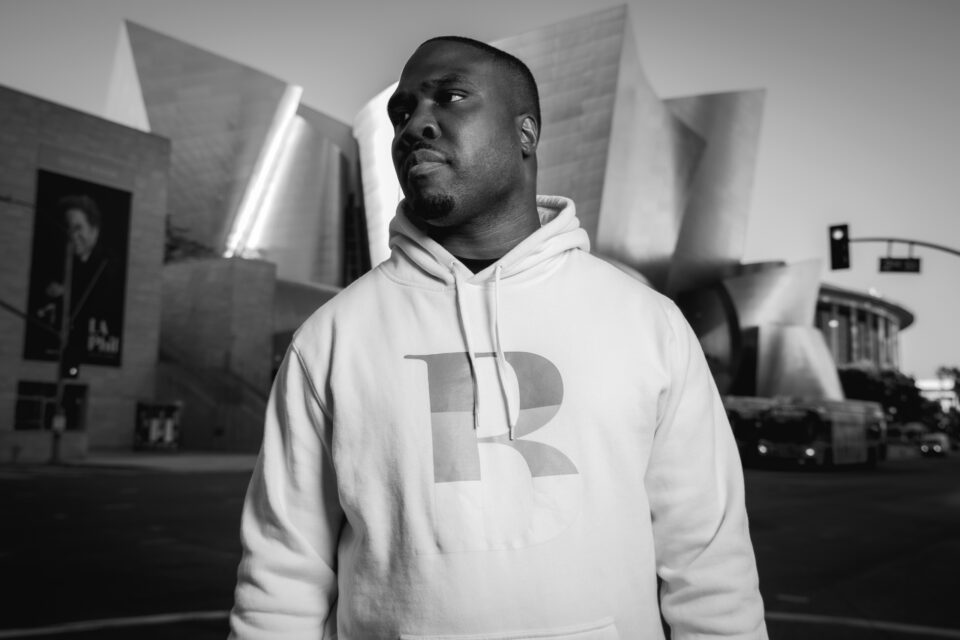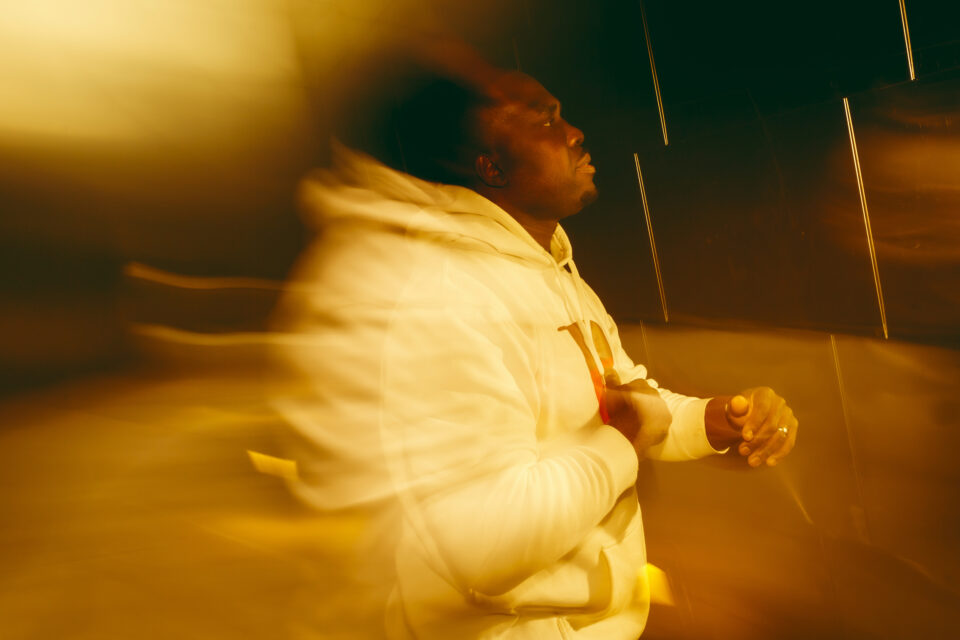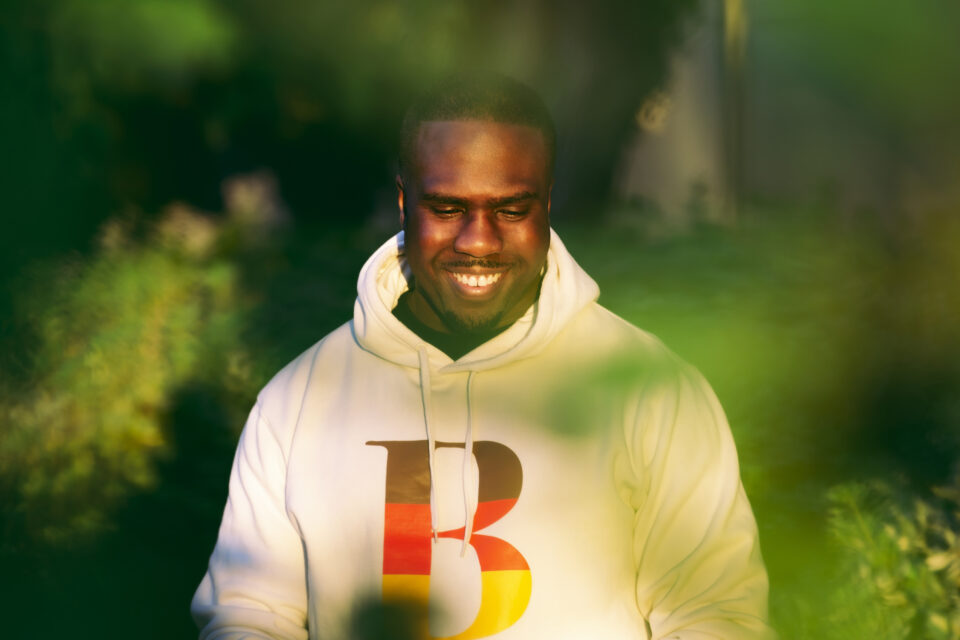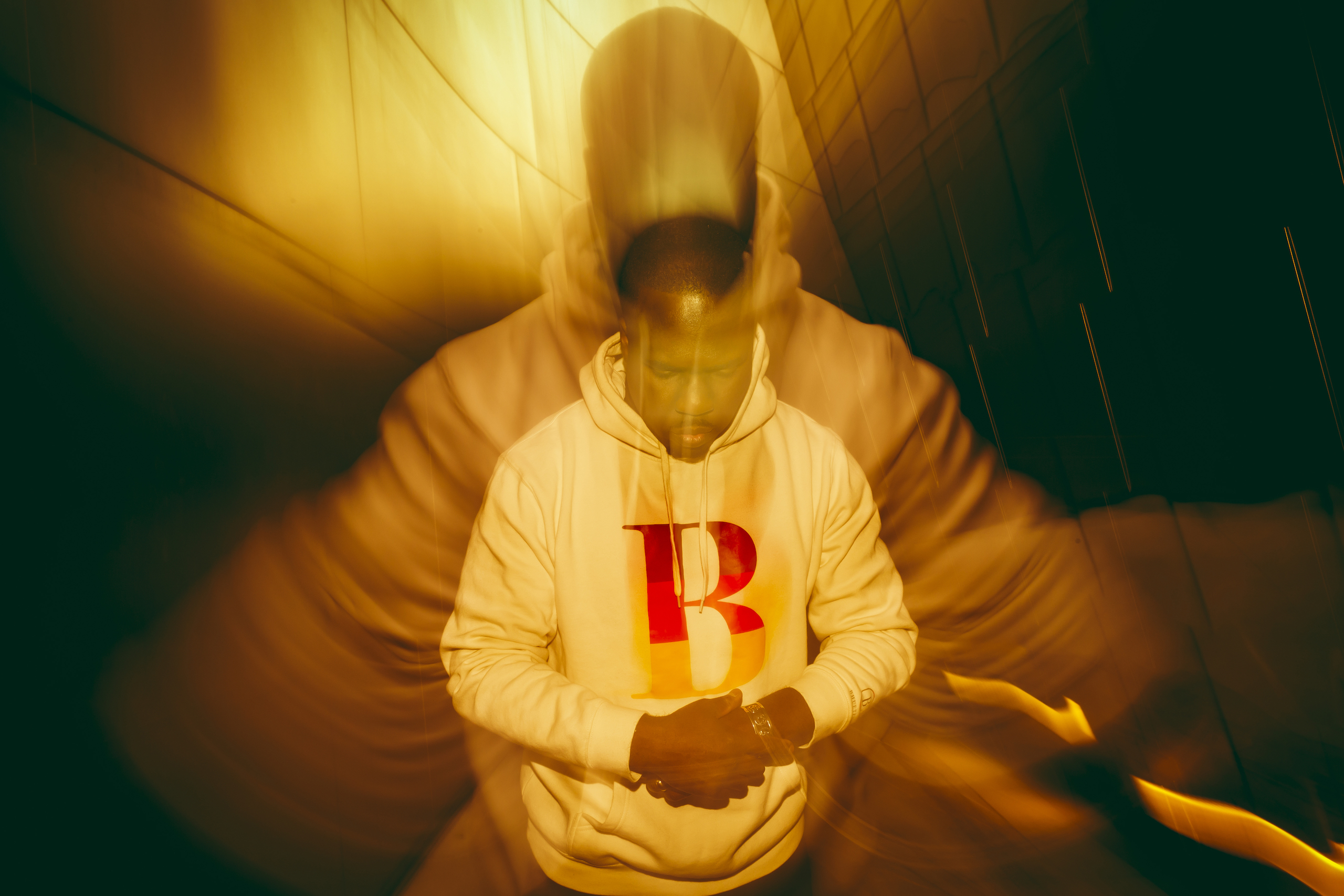This article appears in FLOOD 12: The Los Angeles Issue. You can purchase this special 232-page print edition celebrating the people, places, music and art of LA here.
Derrick Hodge makes thoughts become actions. The GRAMMY-winning bassist had been working on writing orchestrations in his spare time, an interest that was blossoming into a passion. Deciding that he wasn’t dedicating enough time to the pursuit, he started getting other musicians together to work on his ideas. Within a week, an opportunity with the Los Angeles Philharmonic presented itself.
It was spring 2021, and after the long hiatus caused by the pandemic, the Hollywood Bowl was finally reopening. Hodge was approached to work on some songs with his longtime collaborator Common, who was going to be backed in concert by the LA Phil. The two had collaborated on each other’s albums—Common’s Be in 2005 and Finding Forever in 2007, as well as Hodge’s Live Today in 2013. Hodge also worked with the LA Phil on a handful of Common’s songs for the concert, and it felt like a natural fit.

Portrait Session with Derrick Hodge. Photographed in Los Angeles on 10.12.21. For Flood Magazine’s L.A. issue.
A few weeks later, the LA Phil called Hodge wanting to know if he’d work with them to shape Christina Aguilera’s July 2021 show, H.E.R.’s performance the following month, and help bring the score of Black Panther to the Bowl in September. Hodge leapt at the chance. “It wasn't until I just started subtracting and saying, ‘I'm just going to dedicate more time to this writing and give up my time to make sure others can have that opportunity as well,’” he says, “that all of a sudden the opportunity came.”
“They don't wear that energy on their [sleeve],” Hodge says. “You put anything in front of them and they play with a selflessness, as if that's all they've ever done. They show that respect. It's not like, ‘Hey, Derek, nice to meet you. I know you feel very blessed to be in front of us. Show us this music. We'll play it, and we have four minutes before we have to leave the stage.’”
“You put anything in front of [the LA Phil] and they play with a selflessness, as if that’s all they’ve ever done. They show that respect.”
Hodge’s work with the LA Philharmonic comes on the heels of arguably the organization’s most prestigious run, spearheaded by Gustavo Dudamel who has served as the LA Phil’s Music Director since 2009. The New York Times has championed the Dudamel-era Phil as, “the most important orchestra in America,” and Hodge held it in equally high regard. Thus, he was pleased that his status as an outsider didn’t seem to affect how his compositions were received by the prestigious players charged with performing his work.
Through his position with the Phil, Hodge reached back to musicians near his New Jersey hometown. He arranged for them to fly out and sit with him, to watch and review the scores as they were played by the LA Phil at the Hollywood Bowl in real time. The out-of-town musicians got to see the reverence with which the Phil played, how they respected and approached music. For Hodge, paying it forward was essential to making the most of this opportunity with the LA Phil.

Before Hodge made a name for himself in Los Angeles, he laid his musical foundation on the East Coast. He grew up in Willingboro, New Jersey, about 20 miles northeast of Philadelphia. By the time he was six, Hodge was a budding musician drawn to gospel, pop, jazz, and orchestral music. He attended Temple University as the local R&B scene was getting reinvigorated thanks to a number of breakthrough artists like Jill Scott. Hodge toured with Scott as a jazz bassist, but returned to school when classes resumed.
As Scott became a sensation in the year 2000 upon the release of Who Is Jill Scott?: Words and Sounds Vol. 1, Hodge’s focus on his studies had an unintentional effect: Being back at school actually helped him land work on major label projects, ones being produced by many of his contemporaries. Junius Bervine, for instance, hired him to play bass on Vivian Green’s hit single “Emotional Rollercoaster” and Anthony Hamilton’s sensuous “Float.”
“LA kind of felt familiar in terms of the people that were really doing things in a unique way. It felt like there was a nucleus of people doing things, putting each other on, and keeping that network. That’s what I like about it here.”
“That's the beauty of Philly and the greater Philadelphia area,” Hodge says. “It's the big city, but it's compact. Everybody knows each other. And, really, you learn early that it's a people business. I learned the beauty of community, having each other's back. A lot of those opportunities also came because I wasn't trying to make the most money out of a situation, or come up with all these demands. That putting-in-the-work thing also manifested in just being willing to show up. Sometimes that's how I got the call.”
As Hodge continued his studies and landed work on albums by Kenny Lattimore, Floetry, and others, he leaned on one of his core principles: make the uncomfortable comfortable. He bought a computer and started writing compositions, drafting musical scores. It was the early 2000s and he didn’t know what he would do with the music. Hodge just felt that he needed to write, and he wasn’t going to wait for it to be heard. He just put in the work—and took a trip.

Portrait Session with Derrick Hodge. Photographed in Los Angeles on 10.12.21. For Flood Magazine’s L.A. issue.
Hodge flew to Los Angeles, booked a hotel room, and went from studio to studio, introducing himself to as many people as he could. He befriended James Newton Howard and struck up a relationship with Terence Blanchard. The latter, in particular, was impressed by his willingness to work, and offered him an opportunity to work on the score for Who the #$&% Is Jackson Pollock?, a 2006 documentary about the world of high-priced artwork. “LA kind of felt familiar in terms of the people that were really doing things in a unique way,” says Hodge, who also worked with Blanchard on the scores for such films as Inside Man and Cadillac Records. “It felt like there was a nucleus of people doing things, putting each other on, and keeping that network. That’s what I like about it here.
“What stood out most to me was identifying how things look on paper to reflect that emotion,” says Hodge, who collaborated with jazz pianist Robert Glasper to compose the music for the first season of the Starz series Run the World. “Then, how do I manipulate it in completely different worlds? I’ll think like that, even if I'm writing something with my brothers in the Robert Glasper Experiment. I'll write specifically on their personalities and then when the music comes out, I love when I hear other versions of it. But there's nothing like the way they did it, because it was written with the intent of their spirit and nobody else's, like how Duke Ellington used to do it. I use my tools in a very hybrid way, and then let that empower me to be water so that I can approach, years later, a symphonic work for Christina Aguilera or something with that same empty palette where you can go, hopefully, in any direction.” FL









